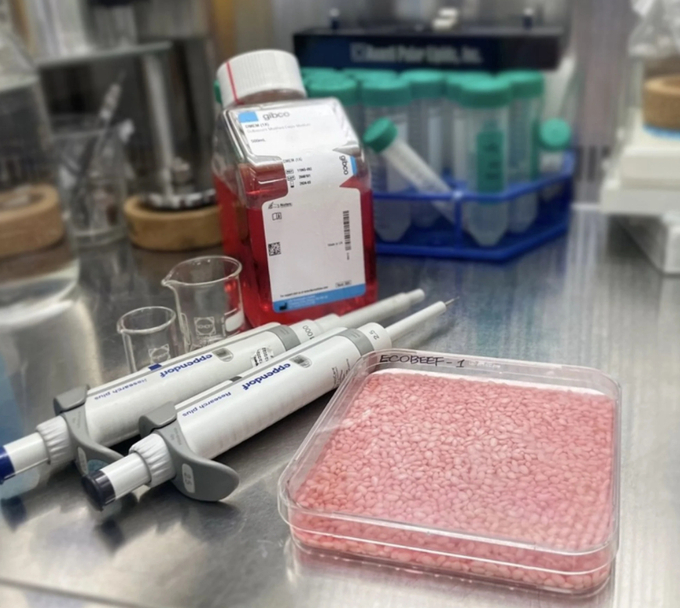November 26, 2025 | 19:28 GMT +7
November 26, 2025 | 19:28 GMT +7
Hotline: 0913.378.918
November 26, 2025 | 19:28 GMT +7
Hotline: 0913.378.918

The meat-rice hybrid is an alternative protein source that has a much lower carbon footprint than normal beef. Photo: SCMPOST
The new grain was grown in a lab by researchers at Seoul’s Yonsei University and is packed with beef muscle and fat cells.
The result is a pink rice that the team says could offer a cheaper and more environmentally sustainable meat alternative and leave a smaller carbon footprint.
“Imagine obtaining all the nutrients we need from cell-cultured protein rice,” said Park So-hyeon, who co-authored the study.
“Rice already has a high nutrient level, but adding cells from livestock can further boost it,” she said in a press release on Wednesday, when the study was published in the Matter journal.
The grain was coated in fish gelatin to help beef cells latch onto the rice, and then left to culture in a Petri dish for up to 11 days.
The final product contained 8 per cent more protein and 7 per cent more fat than regular rice, the team said, and was more firm and brittle than natural grains.
The latest creation left a significantly smaller carbon footprint since the production method eliminates the need to raise and farm animals, which consume “a lot of resources and water and releases a lot of greenhouse gas,” Park said.
For every 100g (3.5 ounces) of protein produced, hybrid rice is estimated to release under 6.27 kilograms of carbon dioxide, while beef production releases eight times more, according to the press release.
If commercialised, it would provide a much cheaper option for consumers in Korea, where the hybrid rice is estimated to cost around US$2.23 per kilo, while beef costs around US$15.
The team plans to further develop the process before the rice goes on the market so that the cells can grow better in the rice grain for more nutritional value.
“Now I see a world of possibilities for this grain-based hybrid food,” said Park.
“It could one day serve as food relief for famine, military ration, or even space food.”
(SCMP)

(VAN) A new study reveals how the simultaneous effects of ocean acidification, salinity and loss of oxygen are making the world more fragile.

(VAN) Hopes are growing that the creation of the first 3D turkey gut model could be a turning point in the battle against the virulent blackhead disease.

(VAN) Tyson, America’s biggest meat supplier, plans to shutter one of its largest beef processing plants as the industry continues to struggle with low cattle supplies and political pressure from Washington.

(VAN) New FAO study shows how digital solutions are empowering farmers and fishers to prevent losses and build resilient agrifood systems.

(VAN) Brazil's COP30 presidency pushed through a compromise climate deal on Saturday that would boost finance for poor nations coping with global warming but that omitted any mention of the fossil fuels driving it.

(VAN) Poultry farmers in the UK have been warned that they could face one of the worst winters yet for bird flu.

(VAN) Prices of main-crop paddy have risen sharply, with jasmine rice hitting 16,100 baht per tonne — the highest level in years.